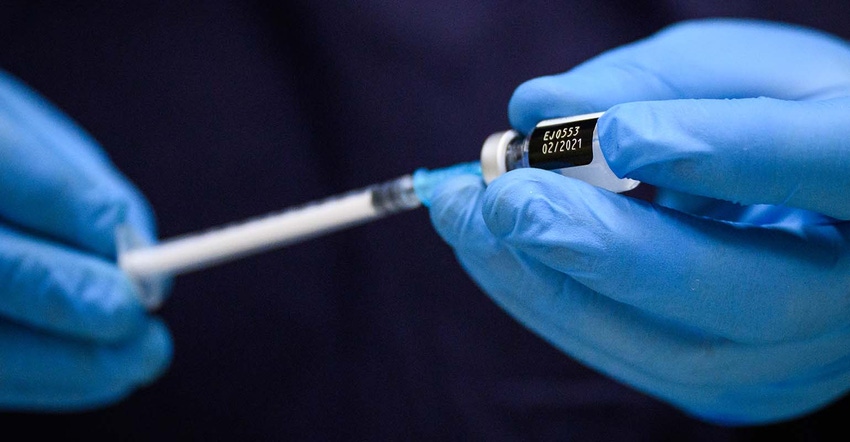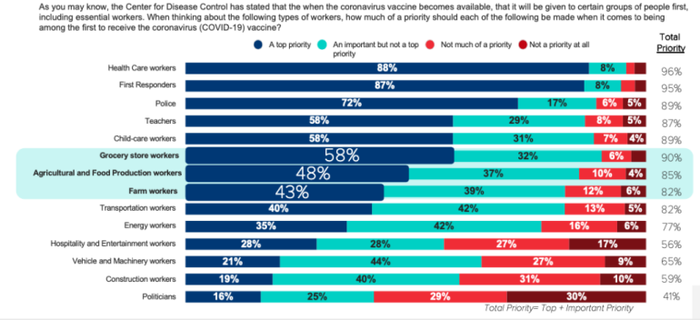Support high for food worker prioritization for COVID vaccine
IDFA survey finds 80% of adults believe food industry workers should be prioritized in receiving coronavirus vaccine.

More than four in five adults believe food workers—manufacturing, retail and farm workers, among others—should be made a priority when it comes to being among the first to receive the coronavirus vaccine, according to an International Dairy Food Association (IDFA) poll conducted by Morning Consult from December 4-7 among a national sample of 2,200 adults. The same poll found an estimated 71% of adults support companies and employers partnering with public health agencies at local and state levels to aid in the distribution of the coronavirus vaccine to employees.
The U.S. Centers for Disease Control and Prevention’s COVID-19 Vaccination Program Interim Playbook designates food industry workers for vaccine prioritization as part of Group 1B, after frontline healthcare workers and other target populations. Prioritization will ensure continued operations and supply of food and other critical consumer packaged goods to people around the country.
Earlier this month, the North American Meat Institute, the National Cattlemen’s Beef Association, and the National Pork Producers Council urged the nation’s governors to highly prioritize COVID-19 vaccination for the men and women who work in the meat and poultry industry, following healthcare workers and those in long-term care facilities.
Related: Who should get the COVID vaccine first?
More than four in five adults agree that grocery store workers (89%), farm workers (85%), and agricultural and food production (86%) workers are essential workers, the survey finds. More than four in five adults believe grocery store workers (90%), agriculture and food production workers (85%), and farm workers (82%) should be made a priority when it comes to being among the first to receive the coronavirus vaccine.

The survey also finds that more than four in five democrats, independents and republicans believe food and agriculture production workers should be made a priority when it comes to being among the first to receive the coronavirus vaccine.
Seven in ten adults support companies and employers partnering with public health agencies at local and state levels to aid in the distribution of the coronavirus vaccine to employees. A bipartisan majority of adults support private companies and employers partnering with public health agencies at local and state levels to aid in the distribution of the coronavirus vaccine to employees.
Two-thirds of adults report they are likely to get the coronavirus vaccine while a third report they are unlikely to, the survey finds. While a majority of adults report they are likely to get the COVID-19 vaccine when it becomes available, Democrats and older adults are the most likely to report they are likely to get the vaccine.
IDFA represents more than 3 million employees across the dairy foods supply chain, including farmers, food processors and manufacturers, food retailers, and other distributors. Food industry workers are recognized as part of our nation’s critical infrastructure by the Department of Homeland Security. IDFA warns without prioritization, supply chains could break down, creating widespread disruptions to our economy. Companies within the food industry are seeking to partner with federal, state and local public health officials to help reinforce the importance and safety of vaccinations and ensure essential food workers can access and receive vaccinations as they become available.
The Meat Institute, NCBA, and NPPC says, “The Committee on Equitable Allocation of Vaccine for the Novel Coronavirus, part of the National Academies of Sciences, Engineering, and Medicine, got it right when it concluded that people in the population group that includes meat and poultry workers ‘need to be provided the vaccine, and special efforts must be made to reach these workers in ways that encourage them to be vaccinated.’”
Since the spring, meat and poultry companies have implemented health recommendations from the Centers for Disease Control and Prevention and the Occupational Health and Safety Administration and, often, additional measures. The industry has spent more than $1 billion on procedures and controls to both support and protect employees. These measures include physical adaptations to facilities, personal protective equipment, enhanced sanitation, advanced ventilation systems, extensive testing and contact tracing, enhanced health care services, and more.
The Morning Consult interviews were conducted online with a target sample of adults across age, race/ethnicity, gender, educational attainment, and region. Results from the full survey have a margin of error of plus or minus 2 percentage points.
About the Author(s)
You May Also Like





